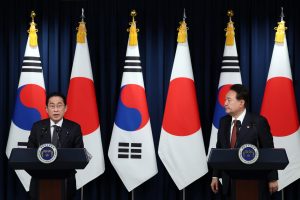With Japan-South Korea relations improving rapidly for the past several months, there are growing calls for an early adoption of a new Japan–South Korea Joint Declaration to update one issued a quarter of a century ago. However, Japan’s Prime Minister Kishida Fumio still takes a cautious stance on it.
Representing Kishida, the prime minister’s press office told The Diplomat on June 30 that he refrains from making any predictions about the outlook of any bilateral statement, including the formulation of the new declaration.
In October 1998, years after the end of the Cold War, then-Japanese Prime Minister Obuchi Keizo and South President Kim Dae-jung signed the epoch-making “Japan-Republic of Korea Joint Declaration: A New Japan-Republic of Korea Partnership towards the Twenty-first Century.” It is also known as the “Japan-Korea Partnership Declaration” or the “Obuchi-Kim Dae-jung Declaration.”
The declaration, which consists of 11 items, states that Tokyo expressed its “deep remorse and heartfelt apology” about its past colonial rule of Korea, while stressing the two nations would work to “build a future-oriented relationship.” It also emphasized the importance of universal principles such as freedom, democracy, and the market economy, as well as the close coordination of North Korea policy, all of which are also required by the two nations now.
After the 1998 declaration, cultural exchanges between the peoples of the two countries flourished like never before, marking a historic departure from their mutual cultural break and social isolation. For example, on the Japanese side, Korean soap operas such as “Winter” Sonata and movies became very popular, as symbolized by the immense popularity of South Korean actor Bae Yong-joon at that time. On the Korean side, young Koreans started earnestly listening to Japanese pop songs called J-pops, reading Japanese manga and novels, and watching Japan’s movies and anime.
In such a warm atmosphere, Japan and South Korea co-hosted the FIFA World Cup in 2002. Prior to the World Cup in December 2001, then-Emperor Akihito even said at a press conference that the mother of Japan’s 50th Emperor Kanmu (737-806) was a descendant of King Muryong of Baekje, one of the Three Kingdoms of Korea, while talking about the significance of the long history of Japan’s exchanges with the Korean Peninsula.
Calls for a new joint declaration are growing recently. At a forum held in Tokyo in late May 2023, Sasae Kenichiro, president of the Japan Institute of International Affairs, who was involved in the drafting process of the 1998 declaration as the director of the Ministry of Foreign Affairs, said, “I strongly support the creation of the ‘second declaration’ following the Japan-South Korea Joint Declaration. I want the governments to review what kind of cooperation they can do now and then put it into practice.”
In response, Park Joon-woo, former senior secretary to the president for political affairs in South Korea, who also worked on the original declaration, said, “The joint declaration should be renewed as soon as possible. It should be implemented based on a relationship of trust between leaders.”
However, Kishida is forced to give political consideration to his ruling Liberal Democratic Party’s conservative wing because they may voice their dissatisfaction with a repetition of words of “deep remorse and heartfelt apology” in the new declaration.
On the other hand, it is also politically sensitive for South Korean President Yoon Suk-yeol to pursue a new joint declaration, as the nation will have a parliamentary general election in April next year. As South Korea’s main opposition Democratic Party (DP) continues to attack the Yoon administration, which is promoting the improvement of Japan-South Korea relations, attention needs to be paid to the proper timing should a new declaration be issued in the coming months and years.
Japan-South Korea relations, which had been chilly for years, have recently been thawing. The solution to the forced labor issue announced by the Yoon administration in March was a breakthrough. In particular, the two nations have strengthened security cooperation to cope with North Korea’s nuclear and missile development activities, which pose the greatest threat to both countries.
Asked by this author “How do you evaluate the security cooperation between Japan and South Korea so far?” Kishida replied in written comments, highlighting the fact that “Since March, Japan-South Korea summit meetings have been held three times in … two months, and this clearly shows the progress in Japan-South Korea relations.”
He also stressed the achievement that the Japan-ROK Security Dialogue was held in April for the first time in about five years, allowing Tokyo and Seoul to exchange views on the strategic environment surrounding the two countries.
“South Korea is a highly important neighboring country to Japan both in a geopolitical context and regarding Japan’s security,” Kishida added.
“In view of the current strategic environment, there has never been a time more important than now to further develop Japan-Korea and Japan-U.S.-Korea cooperation,” he said. “We will continue to maintain close communication with the ROK with a view to strengthening Japan-ROK security and defense cooperation.”
At the defense ministerial meeting of Japan, the United States, and South Korea held in Singapore in June, the three countries agreed to launch a system for real-time sharing of information on ballistic missiles by the end of the year to strengthen their deterrence against North Korea. They also agreed to regularize trilateral joint exercises related to anti-submarine and missile defense.

































